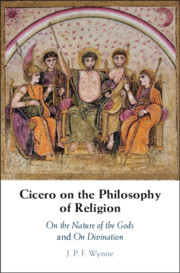Book contents
- Cicero on the Philosophy of Religion
- Cicero on the Philosophy of Religion
- Copyright page
- Dedication
- Contents
- Acknowledgments
- Abbreviations
- Introduction: Cicero and the Translation of Philosophy from Greece to Rome
- Chapter 1 Cicero’s Project in On the Nature of the Gods and On Divination
- Chapter 2 Velleius the Epicurean
- Chapter 3 Balbus the Stoic and Cotta the Skeptic
- Chapter 4 Quintus’ Stoic Case for Divination
- Chapter 5 Marcus’ Arguments against Divination
- Chapter 6 Marcus’ Stance on the Central Question
- Book part
- Bibliography
- General index
- Index locorum antiquorum
Chapter 6 - Marcus’ Stance on the Central Question
Published online by Cambridge University Press: 27 September 2019
- Cicero on the Philosophy of Religion
- Cicero on the Philosophy of Religion
- Copyright page
- Dedication
- Contents
- Acknowledgments
- Abbreviations
- Introduction: Cicero and the Translation of Philosophy from Greece to Rome
- Chapter 1 Cicero’s Project in On the Nature of the Gods and On Divination
- Chapter 2 Velleius the Epicurean
- Chapter 3 Balbus the Stoic and Cotta the Skeptic
- Chapter 4 Quintus’ Stoic Case for Divination
- Chapter 5 Marcus’ Arguments against Divination
- Chapter 6 Marcus’ Stance on the Central Question
- Book part
- Bibliography
- General index
- Index locorum antiquorum
Summary
Being a radical Academic skeptic, Cicero as author does not endorse an answer to the questions of On the nature of the gods and On divination. But when he portrays himself as a character in the dialogues, he portrays himself as finding plausible on those occasions a consistent philosophicaltheology and view of religion. I suggest that this is meant to model the free reaction of a skeptical mind to debates on questions where the skeptic forms no beliefs. The view that Cicero portrays as plausible to "himself" is the Stoic theology that the natural world is divine and benevolent, except that he finds implausible the Stoic view that divination delivers information from the gods (although he says that divinatory practices at Rome should continue for other reasons). Taking this attitude would be one way to "moderate" Roman religion, that is, to avoid impiety and superstition in practising it, but the reader is left free to make up his or her own mind.
- Type
- Chapter
- Information
- Cicero on the Philosophy of Religion<I>On the Nature of the Gods and On Divination</I>, pp. 264 - 278Publisher: Cambridge University PressPrint publication year: 2019

